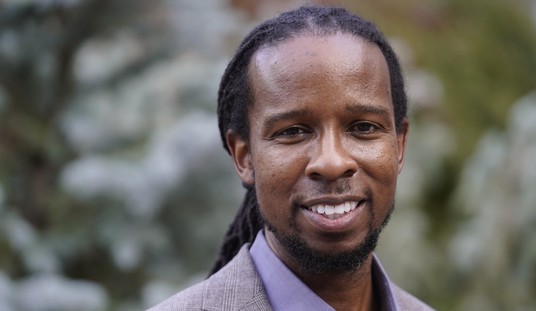Depends on whether one considers “God so loved the world that he sent His only son” to be a recent innovation, I guess. As is the case on practically every utterance from Pope Francis, the media has blown an extemporaneous pastoral comment into a “major shift” from Catholic doctrine. Juan Carlos Cruz, one of a number of Chilean abuse survivors who confronted the pontiff over his remarks defending a bishop who allegedly covered up abuse, told CNN of an exchange he had with Francis about his homosexuality. The Hill sees Francis’ reaction as a sign of a change in Catholic teaching, when it’s anything but:
Juan Carlos Cruz, who recently spent three days with the pope, told CNN that the pope made the comments to him in a private conversation.
Cruz said that the pope told him: “You know Juan Carlos, that does not matter. God made you like this. God loves you like this. The pope loves you like this and you should love yourself and not worry about what people say.”
If true, the comment would mark an unprecedented shift from the Roman Catholic Church’s teachings, which say that homosexuality is a disorder and should be resisted.
CNN also built this up as a “significant departure“:
The Pope’s words would amount to a significant departure from the teaching of the Roman Catholic Church, which considers homosexuality “objectively disordered” and contrary to God’s law.
NBC did a bit better in its coverage, noting that it follows an effort by Francis to provide a more welcoming experience rather than a change in teaching:
Pope Francis’ reported comments to a gay man that “God made you like this” have been embraced by the LGBTQ community as another sign of Francis’ desire to make gay people feel welcomed and loved in the Catholic Church. …
Official church teaching calls for gay men and lesbians to be respected and loved, but considers homosexual activity “intrinsically disordered.” Francis, though, has sought to make the church more welcoming to gays, most famously with his 2013 comment “Who am I to judge?”
Of all the statements a Christian church could make, one might think that “God loves you” would be the least controversial and most well understood, but here we are. Even “God loves you like this” isn’t a terribly surprising statement because Christian faith teaches that God loves all of us even in our current state of sinfulness. In Catholic teaching especially, we enter the world with the taint of original sin, the inheritors of Adam and Eve’s rebellion against God, but that does not distance us from His love and His efforts for us to find redemption.
As Paul writes in his letter to the Romans, “All have sinned and fall short of the glory of God.” We are called to follow Christ’s teachings within His church to embrace Christ and find redemption for our shortfalls, whatever they are. That, however, does not excuse us from following Christ’s teachings and that of the church in regard to sin. Paul writes further in the same chapter, “Do we, then, nullify the law by this faith? Not at all! Rather, we uphold the law.” And in chapter 5, Paul instructs that Jesus came for sinners, not to enable them but to redeem them: “While we were still sinners, Christ died for us.”
Francis has made that distinction between God’s love and our call to redemption a number of times. Crux’s Inés San Martín notes one occasion in her coverage of Cruz’ remarks:
His pastoral tone, however, doesn’t undermine his staunch opposition to promoting or endorsing such “tendencies,” as he told reporters flying with him after his visit to Georgia and Azerbaijan in 2016.
During that flight, he spoke about receiving Neria in the Vatican- without actually giving names, saying that “Life is life, things have to be accepted as they come. Sin is sin,” the pope said. “Tendencies, hormonal imbalance, have and cause so many problems… we must be attentive. Not to say that it’s all the same, but in each case, welcome, accompany, study, discern and integrate. This is what Jesus would do today.”
“When a person (who is gay) arrives before Jesus, Jesus certainly will not say, ‘Go away because you are homosexual,’” Francis said, adding: “Please don’t say that the pope will sanctify trans [transgender people], because I read the headlines in the newspapers.”
Yet he tempered his welcoming tone by reiterating his opposition to gender theory, which presents the idea that even though people are biologically men or women, they can identify as male, female, both or neither. During that trip, he went so far as to say that the teaching of this theory in schools amounted to a “global war” against the family.
It’s particularly galling to see this come up time and again after the Extraordinary Synod on the Family in 2014, which I covered from the Vatican. The bishops of the synod repeatedly made this point over and over again, expressing God’s love for all and welcomeness within the Catholic Church, but that the teachings of the church on sin would not change. The media instead seized on rhetorical flourishes to claim that Francis wanted teachings to change, and then later that the bishops had shut him down, when neither were true.
This is part of the same ignorance. Pope Francis didn’t say anything that the Catholic Church hasn’t said all along, but those who don’t take the time to learn or understand the teachings tend not to report accurately on it.
Addendum: This story is actually much less significant than what else went on in regard to Cruz’ audience with Francis. The entire episcopate in Chile resigned after being rebuked by Francis, an unprecedented act. The pontiff has not yet announced whether he will accept those resignations en masse, consider them individually, or task the bishops to stay on the job and clean up their dioceses after the exposure of abuses and cover-ups, the latter of which ensnared Francis himself in a defense of a bishop. Cruz and other activists want to see the bishops removed, and Francis’ credibility is on the line … in that story, anyway.
Update: “Nothing but” in the first paragraph was supposed to be “anything but.” I’ve changed it above.








Join the conversation as a VIP Member